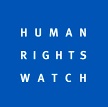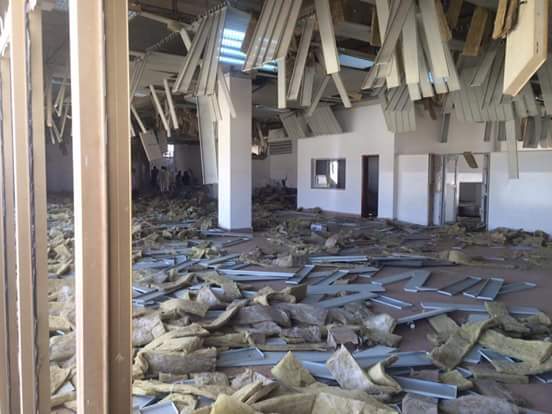By Sami Zaptia.
London, 7 July 2016:
The EU’s efforts to stem migration from Libya risk condemning migrants and asylum seekers to violent abuse at the hands of government officials, militias, and criminal groups in Libya, Human Rights Watch said in a report.
Newly documented abuses include torture, rape, and killings in squalid detention centers where migrants, including people intercepted at sea by the Libyan Coast Guards, are detained, it added yesterday. On June 20, 2016, the EU extended its anti-smuggling naval operation in the central Mediterranean to include training the Libyan Coast Guards and Navy, which are intercepting boats and sending migrants and asylum seekers back to Libya.
The EU is also asking NATO to assist its operation. NATO members will discuss options at their summit in Warsaw on July 8 and 9. “The EU isn’t sending people back to Libya, knowing that’s unlawful, so it wants to outsource the dirty work to Libyan forces,” said Judith Sunderland, associate Europe and Central Asia director at Human Rights Watch. “The EU – soon perhaps with NATO’s help – is basically deputizing Libyan forces to help seal Europe’s border.”
At present, EU and NATO vessels are not allowed to operate in Libyan territorial waters. The EU has acknowledged that, under international law, it may not send people rescued in international waters back to Libya due to extreme dangers in that country. In June, Human Rights Watch interviewed 47 people in Sicily, 23 women and 24 men, who had recently travelled from Libya to Italy on smugglers’ boats.
Those interviewed – from Cameroon, Eritrea, Gambia, Guinea, Ivory Coast, Nigeria, Senegal, and Sudan – said they had left their homes to flee persecution, including abusive military service, to escape forced marriage, or to seek education and work, HRW said.
They described severe abuses in Libya by government officials, smugglers, and members of militias and criminal gangs, and at times collaboration between officials and smugglers. Rampant lawlessness and violence across Libya convinced those who had gone there for work to attempt the perilous sea crossing to Europe. “In Libya, they do whatever they like because there’s no law, no nothing,” said a 31-year-old Gambian man, who told Human Rights Watch that criminals had raped his wife.
Eight of those interviewed said Libyan forces they believed to be from the Coast Guards or Navy had intercepted their boat in various incidents and taken them and other passengers back to land, sometimes beating them. On shore, they were held in immigration detention centers with others apprehended on land for entering Libya irregularly or not having permission to stay.
Most of the centers are run by the Department for Combating Illegal Migration (DCIM), under the Interior Ministry, which is nominally controlled by the UN-backed and EU-recognized Government of National Accord, one of three competing authorities in Libya.
According to an international task force that visits the facilities, DCIM runs approximately 20 centers, most in western Libya, holding roughly 3,500 people. Militias and smugglers run many other non-official detention facilities, the HRW report said. Conditions at DCIM centers in Tripoli, Zawiya, and Subratha were abysmal, former detainees told HRW.
They reported extreme overcrowding, filthy rooms, and insufficient food. Abuses included killing, beatings, forced labour, and sexual violence against men and women. “Guyzo,” a 40-year-old Cameroonian, said he was detained in the southern city of Sebha in December 2014 for not having proper residence papers and spent a year in detention, in three different centers, the last six months in Tripoli
‘‘It was inhumane there. I have many scars…. Six men hanged themselves in my room. [They were] men who had been sodomized, who couldn’t take it anymore. It [rape] happened to me seven times. Four or five men at once, beating me to hold me down. If you resist, they call others to beat you more’’.
In addition to physical abuse, all of the former detainees said no one took them before a judge or allowed them to challenge their detention. Prolonged detention without judicial review amounts to arbitrary detention and is prohibited under international law. Four people described abuses and dangerous maneuvers at sea by the Coast Guards. In one case, the forces sped around a migrants’ rubber dinghy, causing panic.
A Nigerian woman was crushed to death. Given the chaos and violence in Libya, in October 2015 UNHCR, the United Nations refugee agency, called on all countries to “allow civilians (Libyan nationals, habitual residents of Libya, and third country nationals) fleeing Libya access to their territories.” EU policies that result in preventing migrants and asylum seekers from leaving Libya, or that return them to Libya to face serious abuses, contradict the spirit of UNHCR’s call and violate international law, Human Rights Watch said. Article 12(2) of the International Covenant on Civil and Political Rights grants people the right to leave any country, including their own.
The EU should ensure that none of its training, financing, or material assistance to the Libyan Coast Guards and other Libyan authorities worsens human rights abuses, Human Rights Watch said. The EU should support monitoring and public reporting by international observers, including the UN and EU agencies, about detention facilities in Libya, including centers where those rescued or intercepted by the Libyan Coast Guards are detained.
The EU should also press Libyan authorities to end abuse in detention, offer alternatives to immigration detention, and ratify the 1951 Refugee Convention. To assist Libyans and non-Libyans alike, the EU and its member states should generously fund the humanitarian response in Libya, Human Rights Watch said. As of April 2016, the UN’s humanitarian appeal had received only 18.2 percent of the required US $165.6 million.
Any NATO support for EU naval operations should avoid contributing to trapping migrants and asylum seekers in Libya. All NATO vessels in the central Mediterranean should have the mandate and capacity to conduct search and rescue. The UN-backed government in Libya should work to end torture and other ill-treatment in all detention facilities under its control.
It should detain people for immigration purposes only when strictly necessary and for the shortest possible time. “Supporting Libyan forces should be accompanied by ending torture and abuse in the facilities where those forces are sending people,” Sunderland said. “It’s unacceptable to save or intercept people at sea and then send them back for abuse on land.”








